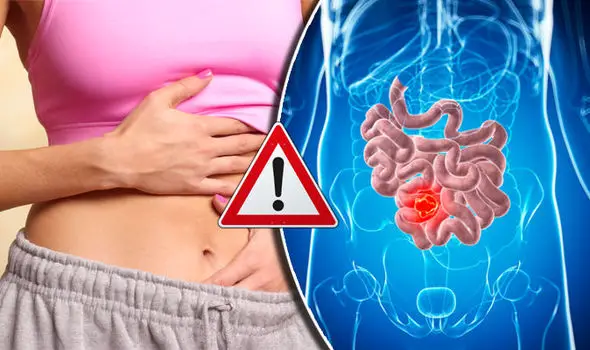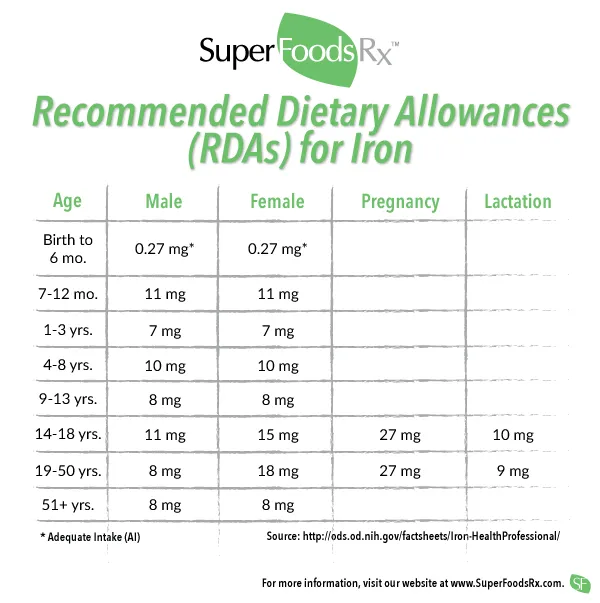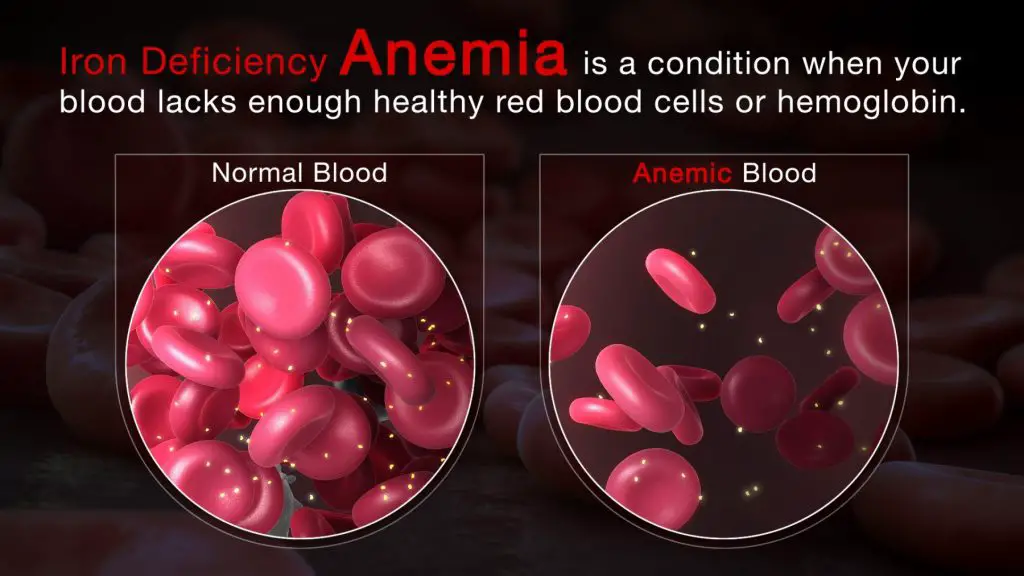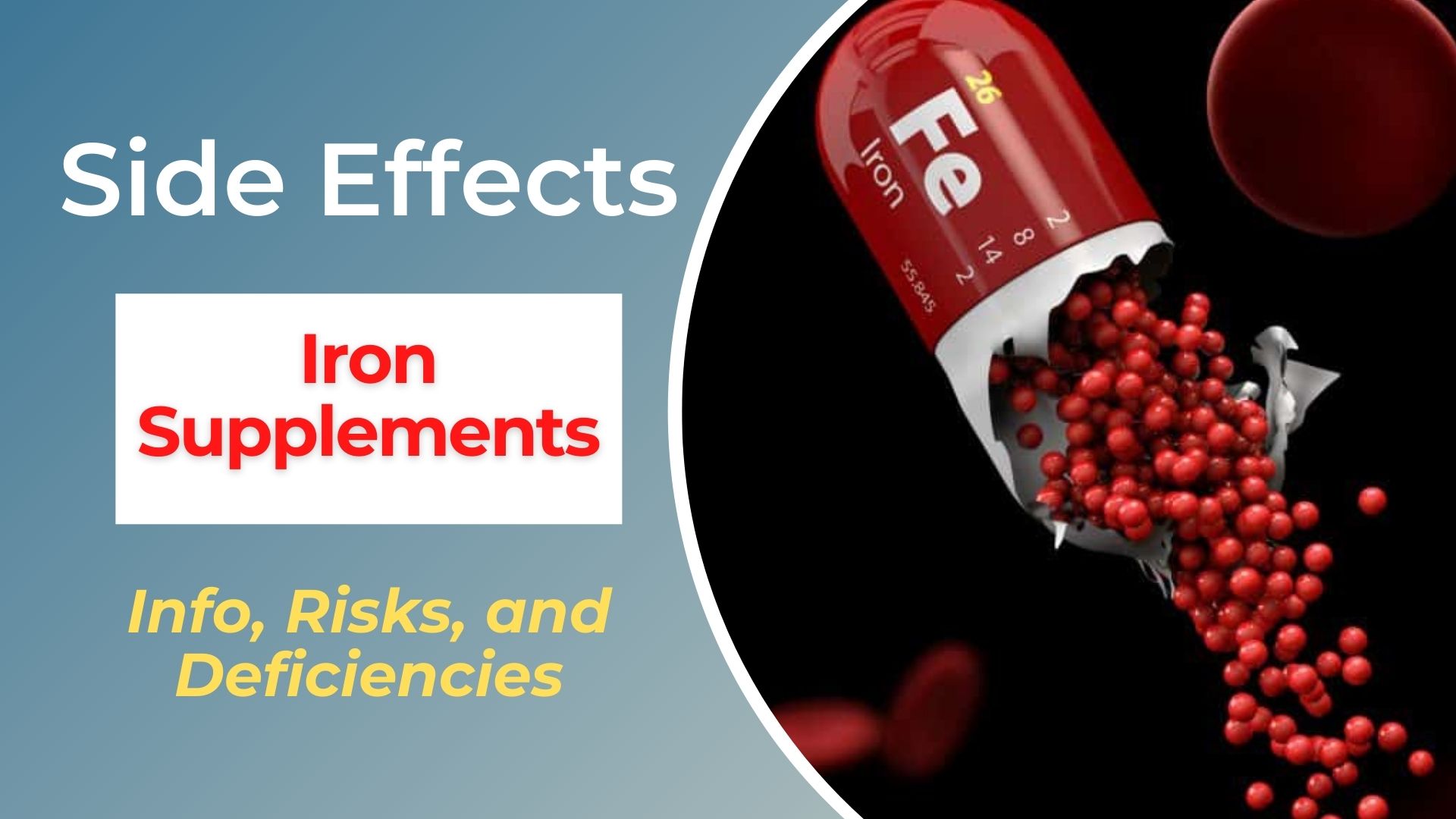Iron is an important mineral that our bodies need in order to function properly. It is found in many different foods, and can also be taken as a supplement if needed.
However, while generally speaking supplements are safe and not harmful, it is important to know the side effects of iron supplements before you start taking them.
In this blog post, we will discuss everything you need to know about iron supplements, including how much to take, and what happens if you take too much.
We will also talk about the possible side effects of iron supplements, such as upset stomach and constipation.
So if you are considering taking an iron supplement, make sure to read this blog post first!
What are the side effects of taking too much iron?

Ferrous sulfate is the most common type of iron supplement. It is usually taken in tablet form, and the amount of iron in each tablet can vary.
The most common side effects associated with taking iron supplements are an upset stomach or constipation.
Other related symptoms include:
- nausea
- vomiting
- diarrhea
- abdominal pain
The best way to prevent an upset stomach from taking an iron supplement is to ingest the supplement with a meal.
This will help to buffer the acidity of the supplement and hopefully prevent any side effects. If you experience any side effects, stop taking the supplement and speak with your doctor.
In very rare cases, people have experienced more serious side effects from taking too much iron. These side effects can include low blood pressure and an irregular heartbeat.
In extremely rare cases iron toxicity can cause death.
Iron toxicity in children
Iron toxicity is most commonly seen in children who have accidentally ingested iron pills.
The term “accidental iron poisoning” has been used for more than 50 years, with scientists recording around 5,000 instances reported to the United States each year (see study here).
The majority of cases are in young children who mistake iron supplements for sweets and the severity of damage is determined by how much was eaten.
Unfortunately, iron in extremely high doses can also be fatal for young children and can cause severe injuries.
Why is iron important?
Why do we need iron anyways?
- Your body needs iron (aka, ferrous sulfate) because it helps to transport oxygen in your blood.
- Iron is also necessary for the production of hemoglobin, which is what gives red blood cells their color.
- Hemoglobin is responsible for carrying oxygen from your lungs to the rest of your body.
If you don’t have enough iron in your diet, you may develop iron deficiency anemia. This condition can cause fatigue, pale skin, and shortness of breath.
How much iron should I take?

The recommended nutritional allowances (RDAS) for iron vary according to age, gender and other factors.
For example, pregnant women need more iron than non-pregnant women (see below). This is why are special iron supplements for pregnant women.
The general recommended dietary allowance for iron is 18 mg per day for adult women and 8 mg per day for adult men.
Most people find that up to 20 mg / kilogram of iron can be normally tolerated but this amount can cause minor digestive discomfort.
However, there are several groups of people who may benefit from more iron.
Pregnant, breastfeeding, vegan, vegetarian, or menstruating
If you are pregnant you may need more elemental iron than the general population.
This is because during pregnancy, your body needs extra iron to make hemoglobin for the baby.
The recommended dietary allowance for pregnant women is 27 mg of iron per day.
If you are breastfeeding, you may also need more iron than the general population.
The most common reason people take iron tablets or other iron supplementation is because they are pregnant or breastfeeding.
The recommended dietary allowance for breastfeeding women is 18-27 mg of iron per day.
If you are vegan or vegetarian, you may need more iron than the general population.
This is because iron is often found in meat (see iron sources below) and plant-based foods may not contain sufficient levels of iron.
The recommended dietary allowance for vegans and vegetarians is about 22 mg of iron per day for women and 14 mg for men, on average.
Despite needing more iron than the general population, please be sure to follow the directions on the iron supplement container.
Be sure to speak with your doctor as well because there can be side effects from taking iron supplements.
Precautions
Patients with iron-overload syndromes like hemochromatosis or hemosiderosis can develop hemolytic anemia and should not take iron supplements.
In these cases iron builds into dangerous levels.
Keep the iron supplements away from children too. Children have smaller bodies and a normal adult dose of iron can sometimes be fatal to a child.
Supplements with ferrous sulfate have a warning sign that will alert parents about these dangers.
Iron Deficiency

Iron deficiency means that your body doesn’t have enough iron to make hemoglobin.
Hemoglobin is the part of your red blood cells that carries oxygen from your lungs to the rest of your body.
Iron deficiency can cause fatigue, pale skin, and shortness of breath.
It is the most common form of anemia and affects about one in every five women and two in every five pregnant women.
Pregnant women and young children are at a higher risk for iron deficiency anemia because they have a greater need for iron and are more vulnerable to blood loss.
Other symptoms of iron deficiency can include:
- irritability
- dizziness
- headache
- cold hands and feet
- restless legs syndrome (tingling or aching in the legs)
- fast heartbeat or irregular heartbeat
- sore tongue or mouth
If you are not certain about whether you are iron deficient, you can order an iron deficiency blood test online.
Causes of Iron Deficiency Anemia
There are many possible causes of iron deficiency anemia.
The most common cause is blood loss. This is usually from heavy menstrual periods (more than 80 mL per month) in women of childbearing age.
This is the most common cause of iron deficiency anemia in premenopausal women and is also a common cause of iron deficiency during pregnancy.
Another common cause of iron deficiency anemia is not getting enough iron in your diet.
This can be due to:
- poor absorption of iron from the gut
- inadequate dietary intake of iron-rich foods
- vegan or vegetarian diets
Certain medical conditions can also lead to iron deficiency anemia. These include:
- peptic ulcer disease (ulcers in the stomach or small intestine)
- chronic kidney disease
- cancer (especially gastrointestinal cancers)
Treatment for Iron Deficiency Anemia
The best way to treat iron deficiency anemia is to take iron supplements. The recommended dose of iron varies depending on age and other factors (see above).
But as we stated above, iron supplements can cause side effects like constipation, stomach upset, and dark stools.
This is why ideally you satisfy your body’s need for iron through food.
You can also pair iron tablets or iron supplementation with vitamin c to boost iron absorption slightly.
Sources of iron in food
There are two types of iron in food: heme and nonheme iron.
These are similar but ultimately different from the ferrous sulfate found in supplements.
Heme iron, which makes up 40 percent of the iron in meat, poultry, and fish, is well absorbed.
Non-heme iron, 60 percent of the iron in animal tissue and all the iron in plants (fruits, vegetables, grains, nuts) is less well absorbed.
Here are some good sources of heme and nonheme iron:
Heme iron sources:
- clams
- oysters
- dark chicken meat
- turkey giblets
- lean beef steak
Non-heme iron sources:
- spinach leaves cooked with lemon juice (or any other vegetable)
- lentils or beans
- enriched flour
- iron-fortified breakfast cereals
But whether you get your iron through diet or supplementation, please do not get iron deficiency anemia!
When and how should I take iron in the morning or at night?
Generally speaking “when” you take iron supplements is less important than “how” and “how much”.
How to take iron supplements? You should take iron supplements with a meal to increase absorption.
If you experience side effects like constipation, stomach upset, or dark stools, talk to your doctor about how to best minimize these iron absorption side effects.
You can try to minimize these symptoms if you take iron supplements with milk or right before bedtime.
Please be sure to follow the instructions on the bottle!
Is it OK to take iron supplements every day?
Yes, it is generally safe to take iron supplements every day. However, side effects are more common with higher doses of iron. Overall the best way to get iron is through diet!
Oral iron supplements are the most common way to take iron supplements.
Can iron pills make you tired?
Feeling tired and fatigued is a common symptom of iron deficiency.
You may feel tired taking iron pills because of the underlying deficiency. However, iron pills won’t themselves make you feel tired.
Side Effects Iron Supplements Conclusion
It is important to make sure that you are getting enough iron in your diet. But if you are taking supplements, it is crucial to be aware of the side effects of taking too much ferrous sulfate.
Iron toxicity can be very serious and even deadly, especially in children. Make sure that you are always following the dosage instructions on any iron supplements you take and consult with a doctor if you have any questions or concerns.
Thanks for reading!
Be sure to check out our ultimate guide to supplements for more information about all types of dietary supplements.



